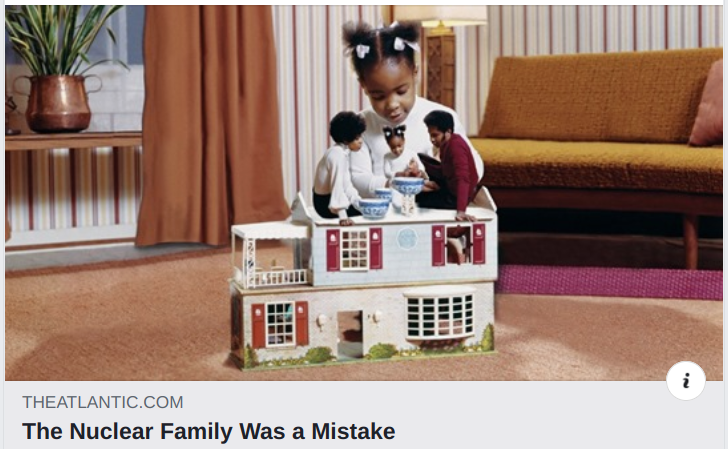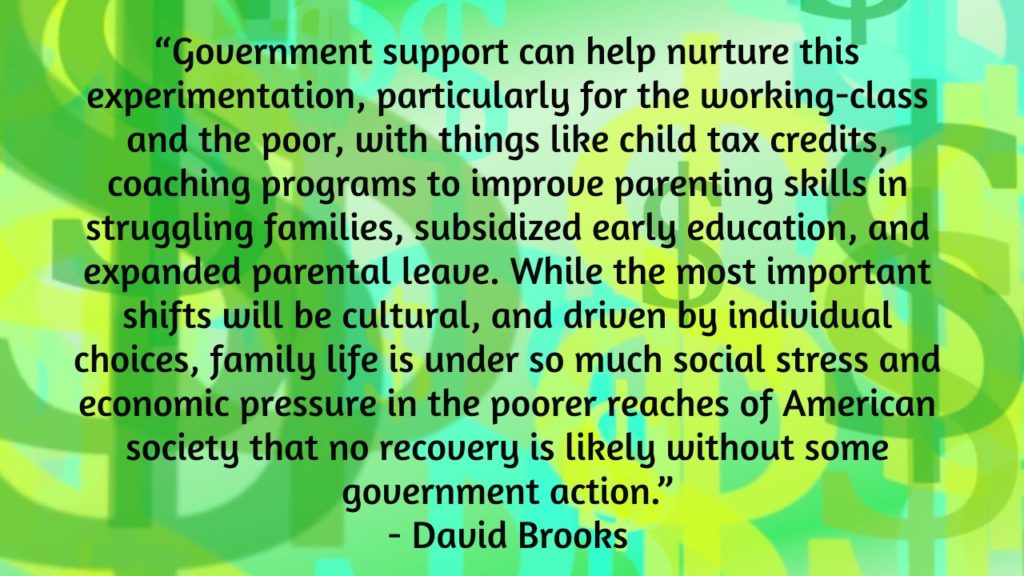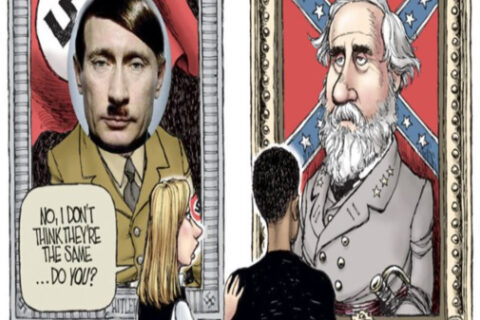David Brooks’ newest for The Atlantic Monthly, “The Nuclear Family Was a Mistake,” has been making the rounds on social media. My initial comment was: “David Brooks pushing subversion? I’m shocked.” I was assured by a couple smart folks that the headline was “clickbait,” the article was “good,” and that Brooks wasn’t “pushing anything.”
Reading a reformer
Still, I was hesitant. I mean, who has the time read a nearly 19,000-word essay by a Never-Trumper, Hillary fanboy, Obama-phile, John McCain-iac, and neocon warhawk in a publication that’s synonymous with blueblood meddlesomeness. “Gotta save the uncultivated multitudes from themselves,” the elitist reformers at The Atlantic have been saying for more than 160 years, and with not a hint of irony.
Finally, I relented and gave the verbose article a gander. And as it turns out, the headline was exactly on point: Brooks is indeed pushing for the destruction of the nuclear family, most notably the ones comprised of white people.
Slyly, Brooks matches interspersed truth with contradictory suppositions, a tactic meant to confuse and distract from his propaganda. For instance, he captures the reader’s attention by quite rightly bemoaning decentralization of the family. “This is the story of our times – the story of the family, once a dense cluster of many siblings and extended kin, fragmenting into ever smaller and more fragile forms.” Oddly, he will eventually cry for more centralization as the fix.
“Extended clans” misunderstood
Brooks discusses the sad state of the multigenerational family, with members now living dispersed around the country. This strikes a chord with me, as my husband and I are advising our three sons to marry young, have (lots of) babies while in their twenties, and stay near us for the “resilience” and positive “socializing force” that is fostered within a close-knit tribe. However, our multigenerational stance would horrify Brooks, and maybe even get us pegged as racists, since it’s a personal secession to his ultimate statist schemes.
“We’ve made life freer for individuals and more unstable for families,” Brooks states, but then notes the “exhausting and stifling” aspect of an individual living within an extended family where “individual choice is diminished.” Well, a person living within any group of people can find the experience tedious, but it’s typically less so with family due to both nature and nurture.
After all, you already share genetic traits with biologic family. And then if you maintain close bonds and live within fixed-location proximity, you’ll also have in common characteristics, customs, expectations, attitudes, faith, and a general worldview. It’s a sociological and historical fact that like-mindedness makes for a more peaceable people.

Break down by design
“As factories opened in the big U.S. cities, in the late 19th and early 20th centuries, young men and women left their extended families to chase the American dream,” Brooks writes. “The decline of multigenerational cohabiting families exactly mirrors the decline in farm employment.”
I wouldn’t say that the agrarian life was willfully abandoned due to some patriotic principle, as Brooks suggests; rather, it was forced out of the Southern people through invasion, war, occupation, and Reconstruction. Peculiar that he calls it “forced migration” when blacks moved to Northern industrial cities, but chides it as self-centered “mobility [and] dynamic capitalism” when white folks do it for the same exact reason: to deal with the purposeful poverty laid upon Dixie by federal subjugation.
When central authoritarianism took hold in 1865, the rural/urban split was decided and cities won. The decultured and deracinated ideology of “nationhood” as superior to family and roots was established on shaky, blood-soaked ground but would be normalized by the media, academia, and government throughout the 20th century, until it became the new abnormal.
Many Southerners – both black and white – eventually conformed, redefining themselves more by consumer products and cul-de-sacs, apartment living and immediacy, government projects and materialist prosperity, crime and drugs than by familial heritage, hearth, and home. Still, many tried to hold on to some vestige of tradition and order within the throes of this purposeful chaos by living out the nuclear-family standard.
Yet, Brooks assails the nuclear family as “brittle” and blames this stabilizing institution for further erosion of kinship and “big, interconnected, and extended families.” Funny that he attacks the reaction to people trying their best to piece together some semblance of sanity within the progressive paradigm, rather than the progressive paradigm itself, which created the dystopian reality in the first place.
In 1984, Southern intellectual Andrew Nelson Lytle wrote that industry is “a modification of the Spartan state, which reduced the family to a minimal role.” Industry is meant to uproot. Lytle and the other “Southern agrarians” knew that if the ties that bind are loosened, the nation-state will tighten its grip. Neocons like Brooks call this “reform,” but I call it genocide.
Pretzel logic
“The period from 1950 to 1965 demonstrated that a stable society can be built around nuclear families – so long as women are relegated to the household” where they were “locked in the kitchen,” Brooks remarks as a gotcha against the nuclear family. But he ends up undoing his own half-truth hyperbole by then blaming “hyper-individualism” (a core tenet of feminism) for the “disintegration” of the family.
“People with an individualistic mind-set tend to be less willing to sacrifice self for the sake of the family, and the result is more family disruption,” asserts Brooks, who then says the nuclear family is the main cause of disruption. This is what you call a cultural-Marxist shell game. Keep your eye on the ball, people!
“Americans now look to marriage increasingly for self-discovery, self-esteem and personal growth,” and being a husband or a wife “is no longer primarily about childbearing and childrearing” but is “primarily about adult fulfillment.” Brooks supposedly laments this social shift yet clamors to institutionalize narcissism and eradicate the civilization-enforcing institution of traditional marriage.

“Though women have benefited greatly from the loosening of traditional family structures – they have more freedom to choose the lives they want – many mothers who decide to raise their young children without extended family nearby find that they have chosen a lifestyle that is brutally hard and isolating.” But somehow still, “We’ve made life better for adults.” So which is it?
If feminism “helped endow women with greater freedom,” shouldn’t they be happy? Everyone can see that women have never been more miserable. It has nothing to do with #MeToo hysteria or the fictional wage gap, but everything to do with the fact that it’s impossible for women to “have it all,” as the left convinced them to believe. Feminists may deny their nature, but nature still has a way of kicking them smack dab in their ill-fitting yoga pants. This disruption benefits Brooks and his ilk, especially when the duped grrrrls blame white, straight men for all of their self-imposed problems.
“Progressives, meanwhile, still talk like self-expressive individualists of the 1970s: ‘People should have the freedom to pick whatever family form works for them.’ And, of course, they should,” writes Brooks, who then lambastes progressives who “have no philosophy of family life at all, because they don’t want to seem judgmental.” That right there is what you call a neocon hustle; his assertions don’t jibe but seem palatable if you’re not paying close attention.
Race-baiting doesn’t add up
Brooks says “detached nuclear families” only benefit the “privileged.” Translation: only white people can pull off having monogamous, stable marriages and functioning kids without the benefit of extended family or the state. This is both ahistorical and immoral.

Craftily, Brooks doesn’t wear his anti-whiteness on his sleeve for the normies to see. Instead, he uses statistics as a red herring, trying to reinforce the black/white “affluence gap,” so it must be whitey’s fault, either personally or systemically.
On one hand, Brooks states that “African Americans have always relied on extended family more than white Americans do” (a claim that is patently false), while on the other hand saying that “African Americans have suffered disproportionately in the era of the detached nuclear family.” He simultaneously lauds the black extended family for having “survived even under slavery,” giving an unintentional nod to the fact that Southern chattel slavery (unlike most forms of slavery) was overwhelmingly paternalistic and allowed (and sometimes even encouraged) blacks to marry and have families.
“Black single-parent families are most concentrated in precisely those parts of the country in which slavery was most prevalent.” Pay no mind to the fact that that’s where most blacks live. Nah, just keep digesting Brooks’ anti-white narrative. Predictably, he praises “immigrants,” Latinos, and Asians for their “multigenerational households,” and gives special attention to Native Americans’ “communal culture,” saying that “you can’t help but wonder whether our civilization has somehow made a gigantic mistake.”
Brooks is using his false sense of compassion for “people of color” as a juxtaposition to demean the white nuclear family. Well, I’ll see you and raise you, David. In 1861, the Five Civilized Tribes allied and fought for the Confederacy for the same reason as white (and some black) Southerners: they were defending home, and kith and kin against puritanical-progressive rule, which is the very same draconian ideology that Brooks is suggesting as an answer to society’s problems.
Subsidizing the “capacity of the village”
After all his crocodile tears for the family, what is Brooks’ remedy for curing the broken family? “Redefining kinship … mixed-income communities that are more amenable to the profusion of family forms … co-housing projects … connected ways of living.” In other words, doubling down on the cause of the crises.
See, without the undergirding of real family foundations, those within “chosen” families are more amenable to any statist swindle that comes down the pike, from smart growth and diversity-and-inclusion regulation, to pedo grooming and atheism, to gun control and hate-speech laws. Brooks’ call for increased centralization is precisely like the totalitarianism of the Bolsheviks tried. He wants you to be “individual” enough to buck tradition, but “collective” enough to do what you’re told.

In true neocon form, Brooks uses LGBT’s “modern chosen-family movement” with its “extremely fluid boundaries” as the model of how us backwards yahoos should be doing things. Yep, the guy who claims to mourn the destruction of the family promotes the reconstructionist aims of the gay-rights movement as the cure. Yep, the guy who says society “is too detached, disconnected, and distrustful” is promoting even more detachment, disconnectedness, and distrust. And wouldn’t you know: he wants you to pay for it!
Wake up, white folks
Brooks is a great case study in what we traditionalists are up against. He’s an influential cultural critic who talks out of both sides of his mouth. He’s a master at using emotional rhetoric while offering prescriptions that will only worsen the societal problems he allegedly hates.
Please consider the advice I offer students in the current-events class I lead at my homeschool co-op: consider the source. At first glance, one might think Brooks is advocating for families. But upon closer inspection, he’s really asking families (and specifically white ones) to willfully suicide themselves. And he’s banking on white guilt to do it.
“Americans overcompensated with sweeping entitlement programs” and turned “a blind eye to accountability on longstanding values and principled behavior within the African American community,” wrote Dean Kalahar. “Discriminating between proper and bad behavior as a legitimate judgment … is not discrimination or bigotry.” So stop falling for the race-bait, people.
While this Jewish journalist pretends to be white, hobnobs with social-justice evangelicals like Tim Keller, and preaches a strange brand of “morality” to unsuspecting white folks (while holding his tribe to much different conventions), his ideas for fighting poverty all center around “nonwhite … upward mobility” (read: more affirmative action, more quotas, more welfare, and more government-manipulated anti-whiteness and black victimhood – some of the very things led to the decline of the family). If he can just convince conservatives to be self-loathing enough and abandon limited-government principles, he’ll have whitey subsidizing his own demise in no time.
Therefore, should we do as Brooks suggests and blame the snake in the bed: the detached nuclear family, which is a consequence of government intrusion and social engineering? Or the person who put the snake in the bed: the statist regime and its comrades who prop up globohomo, technocracy, secular-humanism, and new-world disorder through the anti-family ethos?
Let’s ignore and/or ridicule anyone who wants us to further deconstruct our own kinship and change the definition of family, especially a moralizing quack who fails to even mention God in his excessive screed. There’s never been a better time to return to roots and resist our withering on the vine. Let’s nurture the Christ-centered nuclear family, which is the foundation of multigenerational connectedness, fruitful individuals, and a healthy culture. Let’s not allow ourselves to get bamboozled by Brooks’ sleight of hand. It’s time to rebuild, not break down.
Originally published at DissidentMama.net.
Truth warrior, Jesus follower, wife, and boymom. Apologetics practitioner for Orthodox Christianity, the Southern tradition, homeschooling, and freedom. Recovering feminist-socialist-atheist, graduate of the University of Wisconsin-Madison, and retired mainstream journalist turned domesticated belle and rabble-rousing rhetorician. You can read her blog at Dissident Mama.






I wouldn’t have known Brooks is Jewish until you pointed that out.
Yep.